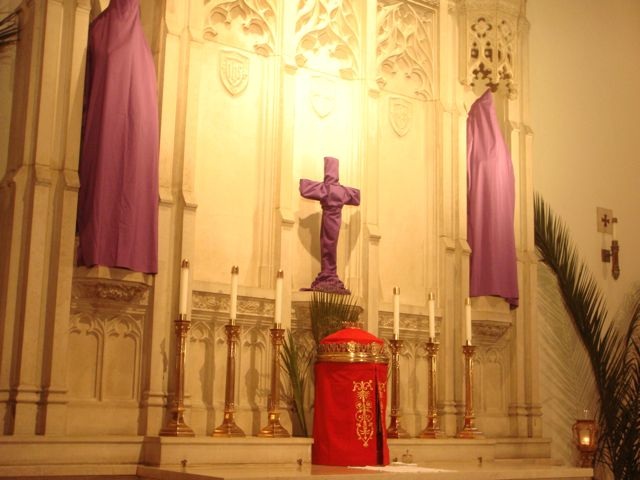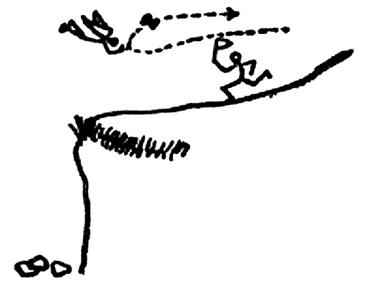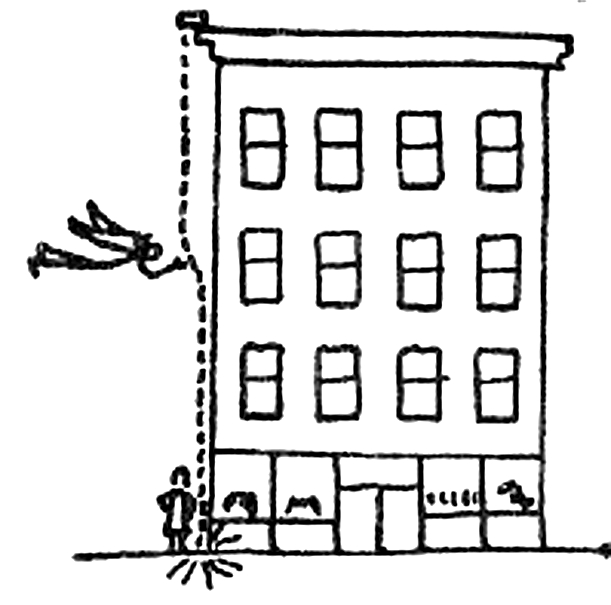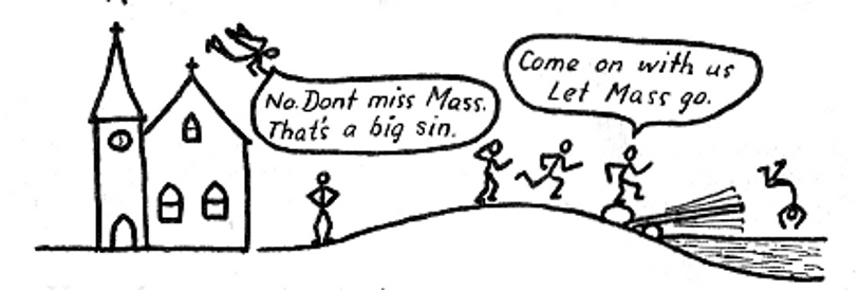
 Sermon on Monday of Holy Week. If the Church is following Her Lord by entering into a Passion, there will be no shortage of devils and stumbling blocks attempting to scandalize us... In this sermon we look at a way to avoid being scandalized from the writings of St. John of the Cross, namely his Precautions. 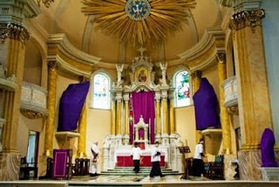 The two weeks between Passion Sunday and Easter. The last week is Holy Week, while the first is called by the Latins "Hebdomas Passionis", by the Greeks "Week of the palms" (from the Sunday following). During this time the monks of the East, who had chosen the desert for a severer mode of life, returned to their monasteries (Cyril of Scythopolis in "Life of St. Euthymius", n. 11). The rubrical prescriptions of the Roman Missal, Breviary, and "Caeremoniale Episcoporum" for this time are: before Vespers of Saturday preceding Passion Sunday the crosses, statues, and pictures of Our Lord and of the saints on the altar and throughout the church, with the sole exception of the crosses and pictures of the Way of the Cross, are to be covered with a violet veil, not translucent, nor in any way ornamented. The crosses remain covered until after the solemn denudation of the principal crucifix on Good Friday. The statues and pictures retain their covering, no matter what feast may occur, until the Gloria in Excelsis of Holy Saturday. According to an answer of the S. R. C. of 14 May, 1878, the practice may be tolerated of keeping the statue of St. Joseph, if outside the sanctuary, uncovered during the month of March, which is dedicated to his honour, even during Passiontide. In the Masses de tempore the Psalm Judica is not said; the Gloria Patri is omitted at the Asperges, the Introit, and the Lavabo; only two orations are recited and the Preface is of the Holy Cross. In the Dominical and ferial offices of the Breviary the doxology is omitted in the Invitatorium and in the responses, whether long or short. The crosses are veiled because Christ during this time no longer walked openly among the people, but hid himself. Hence in the papal chapel the veiling formerly took place at the words of the Gospel: "Jesus autem abscondebat se." Another reason is added by Durandus, namely that Christ's divinity was hidden when he arrived at the time of His suffering and death. The images of the saints also are covered because it would seem improper for the servants to appear when the Master himself is hidden (Nilles, "Kal.", II, 188). In some places the crosses were covered on Ash Wednesday; in others on the first Sunday of Lent. In England it was customary on the first Monday of Lent to cover up all the crucifixes, images of every kind, the reliquaries, and even the cup with the Blessed Sacrament. The cloths used were of white linen or silk and marked with a red cross (Rock, infra, IV, 258). The two beautiful hymns of the season, "Vexilla Regis" and "Pange lingua gloriosi", are the work of Venantius Fortunatus, Bishop of Poitiers. On the Friday of Passion Week the Church very appropriately honours the Seven Dolours of Our Lady. On Saturday the Greeks commemorate the resuscitation of Lazarus. 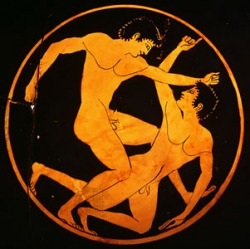 With the fanfare of the Super-bowl comes the interesting question for us Catholics to think about. Is this virtuous or not? We shall not make a definitive judgement of the Super-bowl itself, but we shall lay out the principles for us to follow with regards to whether there is Virtue in Games. The principles espoused here shall be taken directly form St. Thomas and his Summa Theologica, namely the second section of the second part of the Summa Q 168 Article 2, found here. We shall answer it in the same way St Thomas approaches it. We shall give a few objections, answer the question in detail, then answer the objections one by one. Whether there can be virtue in games? Objection 1. Seems not, for St Ambrose says (De Office. 1 23) "Our Lord said: 'Woe to you who laugh, for you shall weep.' Wherefore I consider that all, and not only excessive, games should be avoided." Now something virtuous should not be avoided, therefore games are not virtuous. Objection 2. "Virtue is that which God forms in us, without us," and Chrysostom says [Hom. vi in Matth.]: "It is not God, but the devil, that is the author of fun. Listen to what happened to those who played: 'The people sat down to eat and drink, and they rose up to play.'" Therefore there can be no virtue about games. Objection 3. Aristotle says (Ethic. x, 6) that "playful actions are not directed to something else." (the only end is the fun itself. Ed.) But it is a necessary for virtue that the person in choosing should "direct his action to something else," as the Philosopher states (Ethic. ii, 4). Therefore there can be no virtue about games. BUT St. Augustine says (Music. ii, 15): "I pray thee, spare thyself at times: for it becomes a wise man sometimes to relax the high pressure of his attention to work." Now this relaxation of the mind from work consists in playful words or deeds. Therefore it becomes a wise and virtuous man to have recourse to such things at times. Moreover Aristotle [Ethic. ii, 7; iv, 8] assigns to games the virtue of eutrapelia, which we may call "pleasantness." NOW Just as we need rest for the body, as we can not always be at work as bodies have limits, likewise our souls have limits and need rest. When our souls work they also tire our bodies, because the mind needs the body to process thoughts by using the imagination etc. The sensible things are easier for our mind because they come naturally, but when we think of things beyond them, like contemplation, the weariness is greater and wears us out more, body and soul. A tired body is relieved by resting, the soul's rest is pleasure. So the remedy for weariness of the soul is some application of pleasure by releasing the tension of ones studying. Thus it is related of St. John the Evangelist, that when some people were scandalized on finding him playing together with his disciples, he is said to have told one of them who carried a bow to shoot an arrow. When they had shoot an arrow several times, he asked him whether he could do it indefinitely, the man answered that if he continued doing it, the bow would break. From this St. John drew the inference that likewise a man's mind would break if its tension were never relaxed. Aristotle says (Ethic. iv, 8) that "in the intercourse of this life there is a kind of rest that is associated with games": and consequently it is sometimes necessary to make use of such things. But caution must be taken in three ways:
Reply to objection 1 As we have just said fun should be suited to times and persons. Sacred doctrine is concerned with things of great importance, but St Ambrose does not altogether exclude fun from human speech, but from sacred doctrine, hence he begins the above quote by saying: "Although jokes are at times fitting and pleasant, nevertheless they are incompatible with the ecclesiastical rule; since how can we have recourse to things which are not to be found in Holy Writ?" Reply to objection 2 This saying of St. Chrysostom refers to the inordinate use of fun, especially by those who make the pleasure of games their end; of whom it is written (Wis. 15:12): "They have accounted our life a pastime." Against these Tully says (De Offic. i, 29): "We are so begotten by nature that we appear to be made not for play and fun, but rather for hardships, and for occupations of greater gravity and moment." Reply to objection 3 Playful actions themselves considered in their various kinds are not directed to an end: but the pleasure derived from such actions is directed to the recreation and rest of the soul, and if this be done with moderation, it is lawful to make use of fun. Hence Tully says (De Offic. i, 29): "It is indeed lawful to make use of play and fun, but in the same way as we have recourse to sleep and other kinds of rest, then only when we have done our duty by grave and serious matters." [Ed. So from what St Thomas says, it is more important for those who engage their minds in the higher things to take rest and pleasure from games. So, do not be scandalized if you see Monks, Priests, Brothers, or Sisters out there playing games or kicking a ball for the fun of it. Indeed it helps to give virtuous pleasure (rest) to their minds, enabling them to attain greater works of contemplation, from their rested minds.] 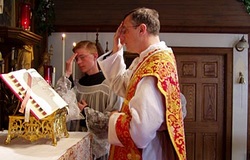 by St Alphonsus The Second Part - From the Introit to the Credo. It is usually in the Introit that the Church proposes the subject of the feast that is celebrated. Mention is therein made of some divine mystery, of the Blessed Virgin, or of some other saint whom the Church honors on that day, so that we simply render this honor to the saint, since the sacrifice, as we have said, is offered only to God. It is asserted that the author of the Introit is St. Gregory the Great, as may be seen in the works of Benedict XIV. 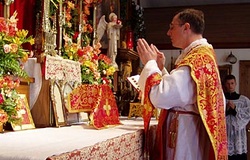 Kyrie, eleison; Christe, eleison. These are Greek words that mean “Lord, or Christ, have mercy.” This prayer is addressed three times to the Father, three times to the Son, and three times to the Holy Ghost. Durand says that Mass was begun to be said in Greek in the Oriental Church at the time of the Emperor Adrian I, about the year 140. Pope St. Sylvester ordered that,after the example of the Greeks, the Kyrie eleison should be said in the Latin Church. According to Cardinal Bellarmine this custom was introduced into Italy about a hundred and fifty years before St. Gregory. Thereby is shown the union that exists between the Greek and the Latin Church. Gloria in excelsis Deo, etc. (“Glory be to God on high, etc.”). This prayer canticle or is formed of the words that the celestial choirs used when the Angel came to announce to the shepherds the birth of the Saviour; “Glory to God in the highest : and on earth peace to men of good will.” The remaining words were added by the Church. In it God is thanked for his glory, because God has used our salvation for his glory by saving us through Jesus Christ, who, in offering himself as a sacrifice to his Father, has procured salvation for men, and has given, at the same time, infinite Glory to God. Then the Church, addressing herself to Jesus Christ, asks him by the merits of his sacrifice to have pity on us; and she concludes by proclaiming him: Quoniam tu solus Sanctus, tu solus Dominus, tu solus Altissimus, Jesu Christe, cum Sancto Spiritu in gloria Dei Patris. Amen (“For Thou only art holy; Thou only art Lord;Thou only, O Jesus Christ, art Most High in the glory of God the Father. Amen”). For our Saviour, who sacrifices himself as a victim, is at the same time God,equal to Him to whom the sacrifice is offered. 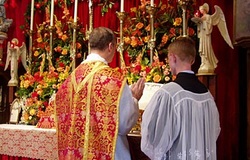 Then follows the prayer or Collect, thus called because the priest, performing the office of mediator between God and men, collects all the prayers of the people, and presents them to God. The Collect is said in a suppliant manner, with outstretched and raised hands. In these prayers are asked of God the graces that have reference to the mystery of the day: for example, at Easter, the grace to rise with Jesus Christ, and at the Ascension to dwell with him in spirit in heaven; or we ask for those graces that we wish to obtain through the intercession of the saint whose feast we are celebrating. But all these prayers are concluded with the name of Jesus Christ: Per Dominum nostrum Jesum Christum (“Through our Lord Jesus Christ"). Because all the graces that we obtain are given to us chiefly in view of the merits of Jesus Christ. It is not true, as the innovators say, that we offer the Sacrifice of the Altar to the saints. It is altogether false; for we know very well that the sacrifice, being a cult or worship that is due to the sovereign Lord of the universe, can be offered only to God; and if at the Mass we make mention of the saints, we do so only because of the favors that they have received from God, to whom they acknowledge they are indebted for all the happiness that they possess. 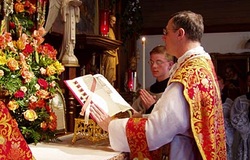 Here follow the Epistle and the Gospel. While listening to the reading of the Epistle, we must hear it as if it is God himself who speaks by the mouth of his prophets and apostles. The Epistle is followed by the Gradual, which, according to Bellarmin, was sung in former times while the deacon ascended the steps of the ambo an elevated pulpit to read the Gospel. The Gradual was followed by the Alleluia, a Hebrew word that signifies Praise the Lord. But in Lent the Alleluia, which expresses joy, is replaced by the Tract, which Abbot Rupert calls the lamentation of penitents (Poenitentium lamentum). 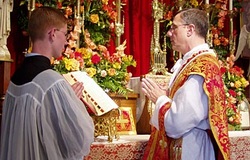 The priest then leaving the left side of the altar, which represents the Jewish people, passes to the right side, which represents the Gentiles, who accepted the Gospel that was rejected by the Jews. We should listen to the Gospel as if we heard the words of our divine Saviour instructing us and we should at the same time himself, ask him for the necessary help to put in practice what he teaches. It is an ancient custom to stand during the reading of the Gospel, to show that we are ready to follow the precepts and counsels that our Lord points out to us. 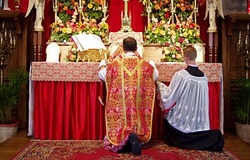 Credo (“I believe”). While the priest is reciting the symbol we should renew our faith in all the mysteries and all the dogmas that the Church teaches. By the symbol was formerly understood a military sign, a mark by which many recognize one another, and are distinguished from one another: this at present distinguishes believers from unbelievers. Benedict XIV. tells us that at Rome the recitation of the symbol during Mass was begun only in the eleventh century. Part 3 Part 1 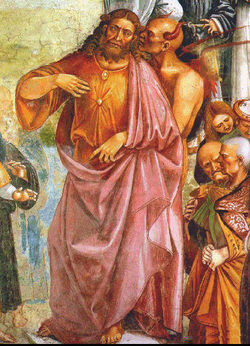 By St Alphonsus Temptations are the most grievous trials that can happen to a soul that loves Jesus Christ, she accepts with resignation every other evil, as calculated only to bind her in closer union with God; but temptations to commit sin would drive her, to a separation from Jesus Christ; and on this account they are more intolerable to her than all other afflictions. We must know, however, that although no temptation to evil can ever come from God, but only from the devil or our own corrupt inclinations: for God is not a tempter of evils, he tempteth no man nevertheless, God does at times permit his most cherished souls to be the most grievously tempted. In the first place, in order that from temptations the soul may better learn her own weakness, and the need she has of the divine assistance not to fall. Whilst a soul is favored with heavenly consolations, she feels as if she were able to vanquish every assault of the enemy, and to achieve every undertaking for the glory of God. But when she is strongly tempted, and is almost reeling on the edge of the precipice, and just ready to fall, then she becomes better acquainted with her own misery and with her inability to resist, if God did not come to her rescue. So it fared with St. Paul, who tells us that God had suffered him to be troubled with a temptation to sensual pleasure, in order to keep him humble after the revelations with which God had favored him: And lest the greatness of the revelations should exalt me, there was given me a sting of my flesh, an angel of Satan to buffet me. Besides, God permits temptations with a view to detach us more thoroughly from this life ; and to kindle in us the desire to go and behold him in heaven. Hence pious souls, finding themselves attacked day and night by so many enemies, come at length to feel a loathing for life, and exclaim: Woe is me, that my sojourning is prolonged ! And they sigh for the moment when they can say: The snare is broken and we are delivered. The soul would willingly wing her flight to God; but as long as she lives upon this earth she is bound by a snare which detains her here below, where she is continually assailed with temptations; this snare is only broken by death: so that the souls that love God sigh for death which will deliver them from all danger of losing him. Almighty God, moreover, allows us to be tempted, to make us richer in merits; as it was said to Tobias: And because thou wast acceptable to God it was, necessary that temptations should prove thee? Thus a soul need not imagine herself out of God's favor because she is tempted, but should make it rather a motive of hope that God loves her. It is a delusion of the devil to lead some pusillanimous persons to suppose that temptations are sins that contaminate the soul. It is not bad thoughts that make us lose God, but the consenting to them; let the suggestions of the devil be ever so violent, let those filthy imaginations which overload our minds be ever so lively, they cannot cast the least stain on our souls, provided only we yield no consent to them; on the contrary, they make the soul purer, stronger, and dearer to Almighty God. St. Bernard says, that every time we overcome a temptation we win a fresh crown in heaven: “As often as we conquer, so often are we crowned.” An angel once appeared to a Cistercian monk, and put a crown into his hands, with orders that he should carry it to one of his fellow-religious, as a reward for the temptation that he had lately overcome. Nor must we be disturbed if evil thoughts do not forthwith disappear from our minds, but continue obstinately to persecute us; it is enough if we detest them, and do our best to banish them. God is faithful, says the Apostle; he will not allow us to be tempted above our strength: God is faithful, who will not suffer you to be tempted above that which you are able; but will make also with temptation issue, that you may be able to bear it? Thus a person, so far from losing anything by temptations, derives great profit from them. On this account God frequently allows the souls dearest to him to undergo the severest temptations, that they may turn them into a source of greater merit on earth, and of greater glory in heaven. Stagnant water soon grows putrid; a soul left at ease, without any struggle or temptation stands in, great danger of perishing from some self-conceit of her own merit; she perhaps imagines herself to have already attained to perfection and therefore has little fear; and consequently takes little pains to recommend herself to God and to secure her salvation; but when, on the contrary, she is agitated by temptations, and sees herself in danger of rushing headlong into sin, then she has recourse to God; she goes to the divine Mother; she renews her resolution rather to die than to sin; she humbles herself, and casts herself into the arms of the divine mercy: in this manner, as experience shows us, the soul acquires fresh strength and closer union with God. This must not, however, lead us to seek after temptations; on the contrary we must pray to God to deliver us from temptations and from those more especially by which God foresees we should be overcome; and this is precisely the object of that petition of the Our Father: Lead us not into temptation; but when, by God s permission, we are beset with temptations, we must then, without either being alarmed or discouraged by those foul thoughts, rely wholly on Jesus Christ, and beseech him to help us; and he, on his part, will not fail to give us the strength to resist. St. Augustine says: “Throw thyself on him, and fear not; he will not withdraw to let thee fall.” You might also like: Remedies against temptations By St Alphonsus Mass is rightly divided into six parts.
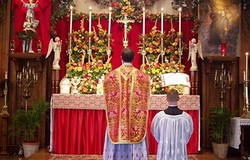 The First Part In nomine Patris et Filii et Spiritus Sancti. Amen (“In the name of the Father and of the Son, and of the Holy Ghost. Amen). In order to sacrifice a victim one must have the power over its life and death; but as God only has the power over the life of his incarnate Son, who is the victim of the Sacrifice of the Mass, the priest needs divine authority in order to be able to offer Jesus Christ to his heavenly Father. Yet as he is invested with the authority that belongs to the priesthood, he says, in union with Jesus Christ, who is the principal one that offers that sacrifice, In the name of the Father and of the Son, and of the Holy Ghost; thus declaring that he offers the sacrifice by the authority of the three Persons. The priest afterwards recites the antiphon Introibo ad altare Dei (“I will go the the altar of God”), and the psalm Judica me Deus (“Judge me O God”). He implores help against the enemies of God they who are laying snares for him. Then expressing the pain that he feels of seeing himself, as it were, rejected by the Lord, he begs him to assist him with his light, and to console him with the graces that he promised by leading him into his tabernacle. Finally, he reproaches himself for indulging in fear, for why should he be troubled when he has with him his God in whom he should confide? Innocent III. attests that the recitation before Mass of the psalm Judica me was the custom of his time, that is, in the twelfth century; and Cardinal Lambertini, afterwards Benedict XIV.,assures us that it was recited before the eighth century. The psalm is concluded with the Gloria Patri. It was Pope St. Damasus who ordained that each psalm should be concluded in this manner. It is, however, believed that the Gloria Patri was introduced by the Council of Nice or, as we are told by Baronius and St. Basil, even by the Apostles, the Council of Nice having added only these words, Sicut erat, etc. Adjutorium nostrum in nomine Domini ('Our help is in the name of the the Lord'). Frightened by grandeur of the act he is about to perform, and by the thought of his unworthiness, the priest asks God's help in the name of Jesus Christ; and acknowledging himself guilty, he accuses himself of his sins, not only before God, but before the Blessed Virgin and all the saints, who on the last day, with Jesus Christ, will pronounce judgment upon sinners. Deus, tu conversus, vivificabis nos ('Thou, O Lord,' says the priest, 'wilt turn and bring us to life'). The sinner remains in death so long as God in his goodness does not come to restore to him the life of grace. Then he implores anew the divine mercy: Ostende nobis, Domine, misericordiam tuam ('Show us, O Lord, Thy mercy') ; and supplicates the Lord to hear him: Domine, exaudi orationem meam ('O Lord, hear my prayer'). Before leaving the people to go up to the altar, the priest says to them, Dominus vobiscum ('The Lord be with you'). By these words he wishes and asks that Jesus Christ may grant to the people as well as to himself the effects of the prayers that he has said; and the server expresses to him the same wish when answering for all the people: Et cum spiritu tuo ('And with Thy spirit'). These reciprocal wishes indicate the union of faith in Jesus Christ that exists between the priest and the people. Aufer a nobis, etc. ('Take away from us our iniquities, etc.'). In going up the steps of the altar, the priest begs the Lord to deliver him from all iniquities, in order that he may approach the Holy of Holies with a pure heart; that is to say, in order that he may worthily offer up the great sacrifice. 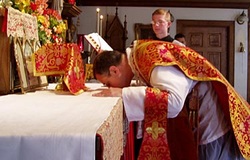 Oramus te, Domine, per merita Sanctorum tuorum, etc. ('We beseech Thee, O Lord, by the merits of Thy saints, etc.'). Having reached the altar, he kisses it, to unite himself to Jesus Christ, represented by the altar; and, through the merits of the holy martyrs whose relics are therein enclosed, he conjures Our Lord to deign to pardon him all his sins. From the first ages the Church was accustomed to offer up the Eucharistic sacrifice on the tombs of the martyrs who had sacrificed their lives for God, and who for this reason have always been particularly honored in the Church. During the first period of the Church there were no other festivals than those of the mysteries of Jesus Christ, those of the Blessed Virgin, and the anniversaries of the martyrs. However, it is not to the saints, but only to God that altars are erected, “and,” as St. Augustine says, “we have not erected an altar to the martyr, Stephen, but with the relics of the martyr Stephen we have erected an altar to God.”1 1 “Nos, in isto loco, non aram fecimus Stephano, sed de reliquiis Stephani aram Deo” Serm. 318, E. B. Second Part  by St Alphonsus Let us come now to the means which we have to employ in order to vanquish temptations. Spiritual masters prescribe a variety of means; but the most necessary, and the safest (of which only I will here speak), is to have immediate recourse to God with all humility and confidence, saying: Incline unto my aid, O God; O Lord, make haste to help me! This short prayer will enable us to overcome the assaults of all the devils of hell; for God is infinitely more powerful than all of them. Almighty God knows well that of ourselves we are unable to resist the temptations of the infernal powers; and on this account the most learned Cardinal Gotti remarks, “that whenever we are assailed, and in danger of being overcome, God is obliged to give us strength enough to resist as often as we call upon him for it.” And how can we doubt of receiving help from Jesus Christ, after all the promises that he has made us in the Holy Scriptures? Come to Me, all you that labor and are heavy laden, and I will refresh you? Come to me, ye who are wearied in fighting against temptations, and I will restore your strength. Call upon Me in the day of trouble: I will deliver thee, and thou shalt honor Me. When thou seest thyself troubled by thine enemies, call upon me, and I will bring thee out of the danger, and thou shalt praise me. Then shalt thou call, and the Lord shall hear: thou shalt cry and He shall say, Here I am. Then shalt thou call upon the Lord for help, and he will hear thee: thou shalt cry out, Quick, O Lord, help me! and he will say to thee, Behold, here I am; I am present to help thee. Who hath called upon Him, and He despised him? And who, says the prophet , has ever called upon God, and God has despised him without giving him help? David felt sure of never falling a prey to his enemies, whilst he could have recourse to prayer; he says: Praising, I will call upon the Lord: and I shall be saved from my enemies? For he well knew that God is close to all who invoke his aid: The Lord is nigh unto all them that call upon Him? And St. Paul adds, that the Lord is by no means sparing, but lavish of graces towards all that pray to him: Rich unto all that call upon Him. Oh, would to God that all men would have recourse to him whenever they are tempted to offend him; they would then certainly never commit sin! They unhappily fall, because, led away by the cravings of their vicious appetites, they prefer to lose God, the sovereign good, than to forego their wretched short-lived pleasures. Experience gives us manifest proofs that whoever calls on God in temptation does not fall; and whoever fails to call on him as surely falls: and this is especially true of temptations to impurity. Solomon himself said that he knew very well he could not be chaste, unless God gave him the grace to be so; and he therefore invoked him by prayer in the moment of temptation: And as I knew that I could not otherwise be continent, except God gave it, . . . I went to the Lord and besought Him. In temptations against purity (and the same holds good with regard to those against faith) we must take it as a rule never to strive to combat the temptation hand to hand; but we must endeavour immediately to get rid of it indirectly by making a good act of the love of God or of sorrow for our sins, or else by applying ourselves to some indifferent occupation calculated to distract us. At the very instant that we discover a thought of evil tendency, we must disown it immediately, and (so speak) close the door in its face, and deny it all entrance into the mind, without tarrying in the least to examine its object or errand. We must cast away these foul suggestions as quickly as we would shake off a hot spark from the fire. If the impure temptation has already forced its way into the mind, and plainly pictures its object to the imagination, so as to stir the passions, then, according to the advice of St. Jerome, we must burst forth into these words: “O Lord, Thou art my helper.” As soon, says the saint, as we feel the sting of concupiscence, we must have recourse to God, and say: “O Lord, do Thou assist me;” we must invoke the most holy names of Jesus and Mary, which a wonderful possess efficacy in the suppression of temptations of this nature. St. Francis de Sales says, that no sooner do children spy a wolf than they instantly seek refuge in the arms of their father and mother; and there they remain out of all danger. Our conduct must be the same: we must flee without delay for succor to Jesus and Mary, by earnestly calling upon them. I repeat that we must instantly have recourse to them, without giving a moment's audience to the temptation,or disputing with it. It is related in the fourth paragraph of the Book of Sentences of the Fathers that one day St. Pacomius heard the devil boasting that he had frequently got the better of a certain monk on account of his lending ear to him, and not instantly turning to call upon God. He heard another devil, on the contrary, utter this complaint: As for me, I can do nothing with my monk, because he never fails to have recourse to God, and always defeats me. Should the temptation, however, obstinately persist in attacking us, let us beware of becoming troubled or angry at it; for this might put in it the power of our enemy to overcome us. We must, on such occasions, make an act of humble resignation to the will of God, who thinks fit to allow us to be tormented by these abominable temptations; and we must say: O Lord, I deserve to be molested with these filthy suggestions, in punishment of my past sins; but Thou must help to free me. And as long as the temptation lasts, let us never cease calling on Jesus and Mary. It is also very profitable, in the like importunity of temptations, to renew our firm purpose to God of suffering every torment, and a thousand deaths, rather than offend him; and at the same time we must invoke his divine assistance. And even should the temptation be of such violence as to put us in imminent risk of consenting to it, we must then redouble our prayers, hasten into the presence of the Blessed Sacrament, cast ourselves at the feet of the crucifix, or of some image of our Blessed Lady, and there pray with increased fervor and cry out for help with groans and tears. God is certainly ready to hear all who pray to him; and it is from him alone, and not from our own exertions, that we must look for strength to resist; but sometimes Almighty God wills these struggles of us, and then he makes up for our weakness, and grants us the victory. It is an excellent practice also, in the moment of temptation, to make the sign of the cross on the forehead and breast. It is also of great service to discover the temptation to our spiritual director. St. Philip Neri used to say, that a temptation disclosed is half overcome. Here it will be well to remark, what is unanimously admitted by all theologians, even of the rigorist school, that persons who have during a considerable period of time been leading a virtuous life, and live habitually in the fear of God, whenever they are in doubt, and are not certain whether they have given consent to a grievous sin, ought to be perfectly assured that they have not lost the divine grace; for it is morally impossible that the will, confirmed in its good purposes for a considerable lapse of time, should on a sudden undergo so total a change as at once to consent to a mortal sin without clearly knowing it; the reason of it is, that mortal sin is so horrible a monster that it cannot possible enter a soul by which it has long been held in abhorrence, without her being fully aware of it. We have proved this at length in our Moral Theology. St. Teresa said: No one is lost without knowing it; and no one is deceived with out the will to be deceived. Wherefore with regard to certain souls of delicate conscience, and solidly rooted in virtue, but at the same time timid and molested with temptations (especially if they be against faith or chastity), the director will find it sometimes expedient to forbid them to discover them or make any mention of them; because, if they have to mention them they are led to consider how such thoughts got entrance into their minds, and whether they paused to dispute with them, or took any complacency in them, or gave any consent to them; and so, by this too great reflection, those evil imaginations make a still deeper impression on their minds, and disturb them the more. Whenever the confessor is morally certain that the penitent has not consented to these suggestions, the best way is to forbid him to speak any more about them. And I find that St. Jane Frances de Chantal acted precisely in this manner. She relates of herself, that she was for several years assailed by the most violent storms of temptation, but had never spoken of them in confession, since she was not conscious of ever having yielded to them; and in this she had only followed faithfully the rule received from her director. She says, “ I never had a full conviction of having consented.” These words give us to understand that the temptations did produce in her some agitation from scruples; but in spite of these, she resumed her tranquillity on the strength of the obedience imposed by her confessor, not to confess similar doubts. With this exception, it will be generally found an admirable means of quelling the violence of temptations to lay them open to our director, as we have said above. But I repeat, the most efficacious and the most necessary of all remedies against temptations, is that remedy of all remedies, namely, to pray to God for help, and to continue praying as long as the temptation continues. Almighty God will frequently have decreed success, not to the first prayer, but to the second, third, or fourth. In short, we must be thoroughly persuaded that all our welfare depends on prayer: our amendment of life depends on prayer: our victory over temptations depends on prayer; on prayer depends our obtaining divine love, together with perfection, perseverance, and eternal salvation. You might also like: Why God permits temptations 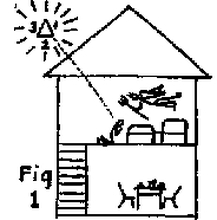 God watches us during the day. But we must say our prayers to keep Him near us all the time. If we do not pray, we shall not get His help to keep from sin. MORNING PRAYERS Johnny gets out of bed. Should he or shouldn't he say his prayers? (Draw Fig. 1.) A big fat devil is hovering near his bed and watching to see if he forgets. The filthy devil wants him to hate God. "You're too tired to say your prayers this morning," he says to Johnny. "Let them go." No. Johnny hates the devil and loves God. He'll please God rather than the devil, and so he kneels down and says his prayers. The devil is enraged and rushes out of the room. We should never do what the devil wishes us to do. "Jesus, help me to be good today and keep me from all sin." EVENING PRAYERS 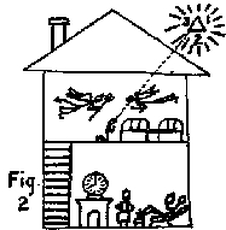 The clock has just struck eight, and Johnny is getting to bed on time. (Draw Fig. 2, omitting for the present angel and devil.) He has played hard all day and is tired, but he remembers that his guardian angel and a devil are in the room with him, waiting to stand guard over him during the night. (Draw angel and devil.) Up in heaven God too is watching him. If Johnny says his prayers, God will be pleased and the angel will stand guard. If he fails to do so, the devil will win and be glad. But Johnny loves God and his guardian angel, and he hates the filthy devil; so he kneels down, thanks God for all He has done, begs pardon for all his sins, and jumps into bed. "Jesus, I thank you for all you did for me today. Forgive me for all my sins."  FIRST DAY—A long, long, long time ago God was up in heaven as happy as could be ... so happy in Himself that He needed absolutely nothing to increase His happiness. But to show His GOODNESS, He decided to make the earth. "Let the earth be made," He said, and FROM NOTHING THE EARTH WAS CREATED. (Draw Fig. 1 — First God in heaven, then darkness, then earth.) SECOND DAY—Then God said: "Let the land and the sea be separated." And immediately the waters went back, and THE LAND WAS MADE. (Draw Fig. 2.) THIRD DAY—Then God said: "Let the earth bring forth the green HERB ... and the FRUIT TREE. . . ."—Gen. 1, 11. (Draw Fig. 3, adding trees and bushes to Fig. 2.) FOURTH DAY— Then God said: "Let there be LIGHTS made in the firmament of heaven, to DIVIDE THE DAY AND THE NIGHT, and let them be for signs, and for seasons, and for days and years, to shine in the firmament of heaven, and to give light upon the earth. . . . And God made TWO GREAT LIGHTS: a greater light to rule the day; and a lesser one to rule the night; and the STARS. And He set them in ... heaven to shine upon the earth; and to rule the day and the night."—Gen. 1, 14. (Draw Fig. 4, adding sun, moon, stars to Fig. 3.) FIFTH DAY—Then God said: "Let the waters bring forth the CREEPING CREATURE having life, and the FOWL that may FLY over the earth. . . . And God created the GREAT WHALES. . . ."—-Gen. 1, 20. (Draw Fig. 5, adding birds and fish to Fig. 4.) SIXTH DAY—Then God said: "Let the earth bring forth the living creature in its kind, CATTLE and CREEPING THINGS, and BEASTS of the earth. ..." God also said: "Let us make MAN to our own image and likeness; and let him have dominion over the fishes of the sea, and the fowls of the air, and the beasts, and the whole earth. . . ."—Gen. 1, 24. (Draw Fig. 6, adding animals and MAN to Fig. 5.) So it was man . . . ourselves . . . who was to be the RULER of all the animals, the sea, the land, and the air. But why should we be the chosen ones to rule the whole world? BECAUSE GOD LOVED US! Can WE think of ever committing sin against so good a God? Let us show our love to Him and thank Him by keeping His commandments. SEVENTH DAY—"So the heavens and the earth were finished, and all the furniture of them. And on the seventh day God ended His work which He had made; and HE RESTED ON THE SEVENTH DAY
And He blessed the seventh day, and sanctified it. . . ."—Gen. 2, 1. Talks based on the Baltimore Catechism, designed for teachers, for home-schooling, to show with graphics either on chalk board or white board Our Faith. We shall include a download of each picture to print out. The Guardian Angels After God creates and places s here on earth, He is so good as to give us os whose main work is to protect us in soul and body. Just as a country has soldiers to protect it from the enemy, so too our guardian angel is ever with us to save us whenever danger threatens us. Once upon a time a little boy ran after a butterfly. It went out towards a cliff. If he ran farther, he reached the edge, the butterfly turned and lead the boy back from danger. The guardian angel was there to protect the boy. (Draw cliff, then boy and butterfly and finally angel.)
Again: A stone falls from the top of a tall building and for some reason misses a little girl's
How often are we tempted to do wrong, but a voice seems to whisper in our ear: "No; that is wrong. Don't do it." Our guardian angel is trying to keep us from sin, and we should do what he tells us.
Pray to your guardian angel every morning and night and in all dangers of souls and body. OFTEN ASK YOURSELF: Will my guardian angel be happy or sad on the last day he reads off to God all the things I did during life? |
Archives
December 2014
Categories
All
While Archbishop Lefebvre Blog is provided free of charge, there are administrative and technical costs associated with making it available to subscribers worldwide and with operating this site. Contributions to offset these costs are appreciated, and may be made via the button below
|
||||||||||||||||||||||
